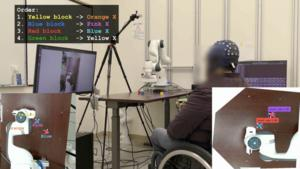UCLA Engineers Unveil AI-Powered Wearable Brain-Computer Interface

Summary
UCLA engineers unveil a wearable, AI-powered brain-computer interface that decodes brain signals in real-time to move robotic arms or cursors, enabling faster task completion and promising assistance for those with limited mobility.
Key Points
- UCLA engineers develop wearable, noninvasive brain-computer interface system that utilizes AI to interpret user intent and move robotic arm or computer cursor
- System allows individuals to complete tasks significantly faster with AI assistance by decoding brain signals and interpreting user direction in real-time
- Noninvasive AI-assisted BCI shows promise for assisting people with limited physical capabilities like paralysis or neurological conditions to handle objects more easily